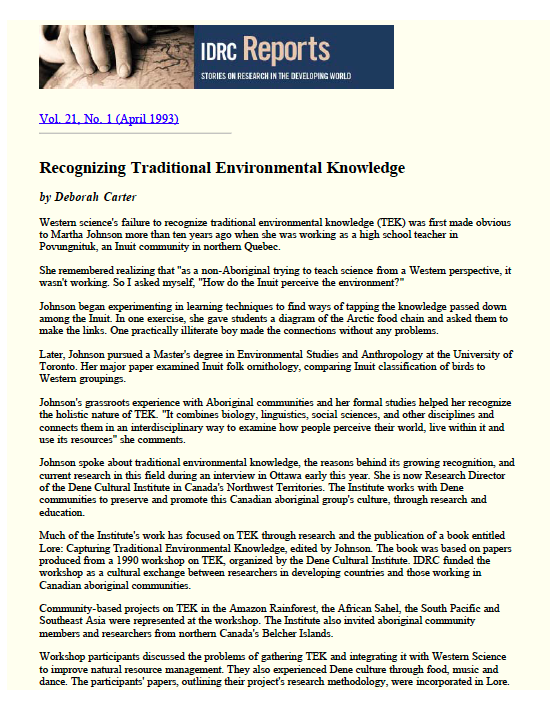Recognizing Traditional Environmental Knowledge
This paper goes over an interview with Matha Johnson, then Research Director of the Dene Cultural Institute (DCI). The conversation touches upon TEK in schools, challenges and opportunities faced by the DCI in its early years, and the future of TEK in resource management.
From Introduction:
"Western science’s failure to recognize traditional environmental knowledge (TEK) was first made obvious to Martha Johnson more than ten years ago when she was working as a high school teacher in Povungnituk, an Inuit community in northern Quebec. She remembered realizing that “as a non-Aboriginal trying to teach science from a Western perspective, it wasn’t working. So I asked myself, “How do the Inuit perceive the environment?” Johnson began experimenting in learning techniques to find ways of tapping the knowledge passed down among the Inuit. In one exercise, she gave students a diagram of the Arctic food chain and asked them to make the links. One practically illiterate boy made the connections without any problems. Later, Johnson pursued a Master’s degree in Environmental Studies and Anthropology at the University of Toronto. Her major paper examined Inuit folk ornithology, comparing Inuit classification of birds to Western groupings. Johnson’s grassroots experience with Aboriginal communities and her formal studies helped her recognize the holistic nature of TEK. “It combines biology, linguistics, social sciences, and other disciplines and connects them in an interdisciplinary way to examine how people perceive their world, live within it and use its resources” she comments. Johnson spoke about traditional environmental knowledge, the reasons behind its growing recognition, and current research in this field during an interview in Ottawa early this year. She is now Research Director of the Dene Cultural Institute in Canada’s Northwest Territories. The Institute works with Dene communities to preserve and promote this Canadian aboriginal group’s culture, through research and education. Much of the Institute’s work has focused on TEK through research and the publication of a book entitled Lore: Capturing Traditional Environmental Knowledge, edited by Johnson. The book was based on papers produced from a 1990 workshop on TEK, organized by the Dene Cultural Institute. IDRC funded the workshop as a cultural exchange between researchers in developing countries and those working in Canadian aboriginal communities. Community-based projects on TEK in the Amazon Rainforest, the African Sahel, the South Pacific and Southeast Asia were represented at the workshop. The Institute also invited aboriginal community members and researchers from northern Canada’s Belcher Islands. Workshop participants discussed the problems of gathering TEK and integrating it with Western Science to improve natural resource management. They also experienced Dene culture through food, music and dance. The participants’ papers, outlining their project’s research methodology, were incorporated in Lore."
Access this Resource:
The full text of this paper is available from the Community Development Library.
Carter, Deborah. “Recognizing Traditional Environmental Knowledge.” Ottawa: International Development Research Centre Reports 21, no. 1 (1993).
Additional Info
- Publication Type: Journal Article
- In Publication: IDRC Reports
- Place Published: Ottawa
- Keywords: Governance|Education|Land Use




 Phone: 867-374-4040
Phone: 867-374-4040 Email:
Email: